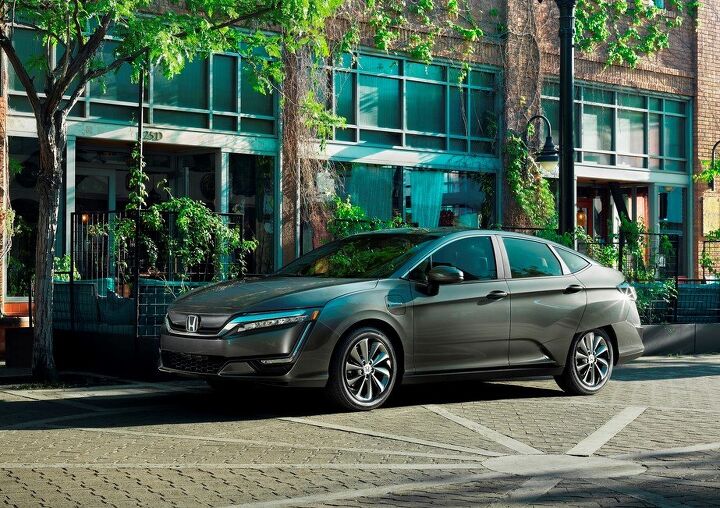If Only the Range Matched the Price: Honda's Clarity EV Leasing for $199 a Month

By that, we mean the figure “199,” not the overall cost of leasing. Moving on…
Honda’s only true EV, the Clarity Electric, began arriving at dealers in California and Oregon Thursday, completing a green trifecta that includes a plug-in hybrid variant and hydrogen fuel cell model. It also carries a lease price that undercuts its rivals by quite a bit.
While Clarity EV lessees stand to pay significantly less for their eco-conscious ride, both up front and on a monthly basis, they’d best familiarize themselves with the location of charging stations.
That’s because the Clarity EV has a range of just 89 miles. No, you haven’t travelled back in time to 2012 — it’s just that the Clarity’s battery space is constrained by Honda’s need for a platform that accommodates three propulsion sources.
Because of this, the Clarity EV’s 25.5 kWh battery pack doesn’t measure up to its competitors, though the range is usable for around-town trips and most commutes. (This author still remembers the gnawing fear felt during a long weekend Ford Focus Electric test a few years back. That model offered 76 miles of range.)
Honda clearly recognizes the car’s limitations in its lease offer. City driving is where EVs shine, and, if you never leave city limits, this large, comfortable cruiser makes an attractive proposition. With $1,499 due at signing, lessees pay $199 a month for 36 months. Drivers might find themselves eligible for state incentives totalling $2,500, too, depending on the date and their place of residence.
“We’re upping the ante on both premium appeal and affordability with the 2018 Honda Clarity Electric,” said Steven Center, Honda’s vice president of Connected and Environmental Business Development, in a statement. Center made sure to mention the Clarity’s “premium level of quality” compared to other lower-priced EVs.
Looking at lease offers in the Los Angeles area, the Clarity beats its rivals hands down. A Chevrolet Bolt leases for $376 a month for a 36-month term, with $4,125 due at signing. Mileage tops out at 30,000 miles. The Bolt is the low-priced rangte leader, boasting 238 miles per charge.
Nissan’s newly upgraded Leaf, now offering 151 miles per charge, leases for $229 a month for 36 months, with $3,979 due at signing. The automaker allows 12,000 miles of emission-free driving per year. Compared to that, Hyundai’s Ioniq Electric, only available in California, leases for $295 a month for the same term, but carries a lower down payment of $2,500. Mileage is unlimited.
Honda’s lease allows 20,000 miles per year, plus free roadside assistance. That’s a lot of recharging cycles.
[Images: Honda]

More by Steph Willems
Latest Car Reviews
Read moreLatest Product Reviews
Read moreRecent Comments
- ToolGuy The only way this makes sense to me (still looking) is if it is tied to the realization that they have a capital issue (cash crunch) which is getting in the way of their plans.
- Jeff I do think this is a good thing. Teaching salespeople how to interact with the customer and teaching them some of the features and technical stuff of the vehicles is important.
- MKizzy If Tesla stops maintaining and expanding the Superchargers at current levels, imagine the chaos as more EV owners with high expectations visit crowded and no longer reliable Superchargers.It feels like at this point, Musk is nearly bored enough with Tesla and EVs in general to literally take his ball and going home.
- Incog99 I bought a brand new 4 on the floor 240SX coupe in 1989 in pearl green. I drove it almost 200k miles, put in a killer sound system and never wish I sold it. I graduated to an Infiniti Q45 next and that tank was amazing.
- CanadaCraig As an aside... you are so incredibly vulnerable as you're sitting there WAITING for you EV to charge. It freaks me out.



































Comments
Join the conversation
Just saw one of these in the wild Friday here in the Peoples Republic of Oregon. Had no idea that the release was so limited....just like the range.
"Being designed for 3 different powertrains" being the factor that limits the range sounds like a lame excuse. There has to be a ton of unused space under the hood.